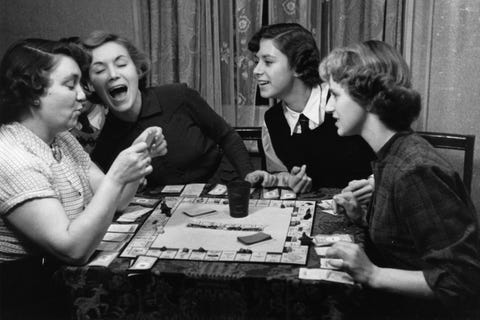
Maurice AmblerGetty Images
Both board games and video games have been in the news this week, between a high-profile ousting of leadership at Cards Against Humanity and a series of allegations against game developers. Yet even through all that vital and troubling news, one questionable opinion still rang out.
This content is imported from Twitter. You may be able to find the same content in another format, or you may be able to find more information, at their web site.
The replies to the author's long thread include many simple corrections: there are hundreds or more games where no one hides anything and everyone works together; the “sports” she exempts are also full of secrecy; and everyday life with our friends and family includes both strategy and secrets and inspired many of the mechanics of the board games we love.
Does the author dislike a round of euchre around the family table after dinner? Is Yahtzee also bad? Are all those Jane Austen moments where the landed gentry retreat to play whist very sinister indeed?
One of the most popular psychology books of all time is called Games People Play, underlining the informal way we call many human interactions “games.” People who are confusing and obtuse when you try to date them are accused of “playing games,” even by the Backstreet Boys. Dating profiles use “no games” as shorthand to mean, well, a lot of things. Game theory, meanwhile, studies the way the math of our interactions breaks in favor of one "player" or the other based on rules, incentives, and more.
Saying that "nearly all games require some level of secrecy and deception" is painting with the broadest of brushes. Unless you're playing Secret Hitler with children, I don’t see a lot of undermining in family games like Candyland or even Monopoly. To suggest even the idea of holding your own hand of cards is a bad lesson is absurd; gameplay features like this help children learn about boundaries and personal space.
This content is imported from Twitter. You may be able to find the same content in another format, or you may be able to find more information, at their web site.
Playing Go Fish isn’t a hotbed of harmful secrets. Children’s sense of autonomy is as vital as anything else, and having “their own” cards to hold or token to control helps them learn about the permanence of things, math and language skills like counting and describing, and how to take ownership of things in their care. Losing a game helps children learn grace and good sportsmanship.
So are we talking about adults here, then? Certainly we’ve all played a board game that went sour because of someone’s terrible attitude, or because Monopoly takes 500 years to play and everyone’s blood sugar is low. Or is it Scrabble? If your children have already figured out how to defensively block their opponents in Scrabble, I don't know what to tell you except that I think your kids sound awesome and precocious.
Put away the games that make people in your family feel bad, and instead pick up any number of bestselling or indie games where your group puts their heads together to decide how best to proceed. Monopoly, which can definitely bring out the worst in the wrong kind of player, isn’t secretive at all! You could argue that's one reason why it feels so boring sometimes. Even Battleship, where you hide your board from your opponent, is about strategic guessing and logical reasoning, not “undermining.”
Then there are countless full-on cooperative games like the very relevant Pandemic and Forbidden Island, where talking through what to do next could show you new sides of your family members and their ability to think creatively.
The suggested alternatives to playing games in this tweet, like running and hiking and a baffling exception for all of "sports," certainly aren't accessible to everyone, let alone every family group. But to turn that into a flimsy, unsupported argument that games are bad for children, when there’s mountains of evidence to the contrary? There's a game going on here after all.
This content is created and maintained by a third party, and imported onto this page to help users provide their email addresses. You may be able to find more information about this and similar content at piano.io
"board" - Google News
July 03, 2020 at 11:00PM
https://ift.tt/38qlezS
In Defense of Board Games, Which We Shouldn't Have to Defend - Popular Mechanics
"board" - Google News
https://ift.tt/2KWL1EQ
https://ift.tt/2YrjQdq
Bagikan Berita Ini














0 Response to "In Defense of Board Games, Which We Shouldn't Have to Defend - Popular Mechanics"
Post a Comment